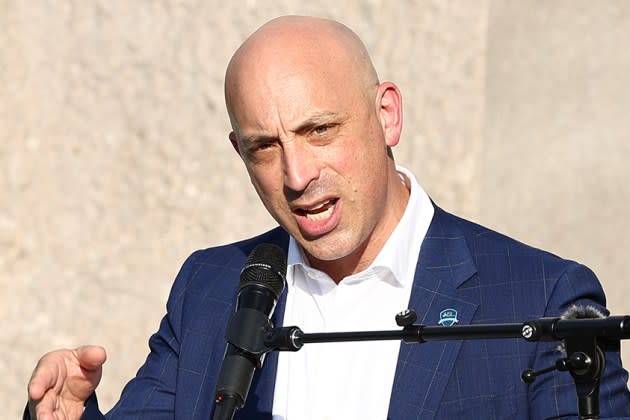Jonathan Greenblatt: In 2023, Fighting Antisemitism Requires Constant Vigilance (Guest Column)

The American Jewish community has been on high alert for years. In the half-decade since 11 Jewish worshippers were murdered during a Shabbat service in Pittsburgh, congregations across the country have installed security cameras, hired armed guards, and attended active shooter training sessions.
The tension, however, has escalated in recent weeks. Every Saturday morning, synagogues across the country had prayer services threatened by antisemitic hoaxes. A coordinated group of extremists online perpetrated attacks known as swatting, the deliberate, malicious act of reporting a false emergency to evoke an aggressive response from law enforcement. Since mid-July, at least 71 synagogues in at least 14 states have received these threats.
More from Variety
'The Light in the Darkness' Creator Shares How His Video Game Can Educate People About the Holocaust
The perpetrators are targeting synagogues’ livestreaming services so they can watch in real time as the SWAT teams arrive in response to claims of bomb threats or active shooter situations. Later, they post clips of the frightened worshippers online, further traumatizing the targets.
Most Americans are unaware of the multi-headed threat facing the Jewish community in 2023. Antisemitism is not just coursing through our social media feeds, it’s being projected onto buildings, hung over highway overpasses and interrupting town council meetings. It is being livestreamed by hate groups, littered across cities and even creeping onto college campuses.
And this threat is not the purview of any one political ideology or party — we see manifestations of anti-Jewish hate from the extreme left and on the far right.
At the anti-hate organization I lead, the Anti-Defamation League (ADL), we have battled all forms of antisemitism for 110 years. But rarely in our history has there been such an onslaught of new tactics to advance Jew hatred. It means we need to be more adaptive than ever.
To understand this threat and to show you how ADL responds in the moment, let me take you to Georgia earlier this summer, when at least 14 individuals affiliated with the Goyim Defense League (GDL), a loose network of people who share antisemitic, anti-LGBTQ+ and white supremacist thinking, set out on a “Name the Nose Tour” — their words — to antagonize Jewish communities. Their goal: to turn Americans against the Jewish people by spreading myths and conspiracy theories.
They distributed propaganda fliers in various city neighborhoods, blaming Jews for the COVID pandemic, pornography, the slave trade and perceived societal woes such as immigration. They gathered outside several synagogues, where they yelled slurs, insulted passersby, brandished offensive signs and waved swastika flags. And wherever they went, they aimed to provoke reactions, even physical altercations that they could film or livestream to engage with and entertain followers and, ultimately, feed GDL’s coffers.
Our experts in the ADL Center on Extremism knew GDL had been planning this onslaught for weeks.
We alerted law enforcement, providing them with information about the group’s tactics documented from previous GDL tours. Ten of the 11 participants were known to ADL as associates of the GDL. We identified them to authorities and watched in real time as county deputies arrested their leader for disorderly conduct.
We don’t always know why hate groups choose the places they target, but over this weekend we could speculate. Driving up I-75 from Florida, Macon, Georgia is the first major stop. And the Marietta synagogue is right near where Leo Frank, a Jewish man, was lynched by a mob in 1915, two years after the founding of our organization. Photos GDL extremists took while posing in front of Frank’s memorial that night proved their destination was no accident.
Using our expertise and knowledge, we prepared the Jewish community for what the weekend would bring. We met with local political leaders, supported their anti-hate work and welcomed statements of solidarity with the Jewish community from valued partners, such as the Georgia NAACP. We also participated in and helped facilitate unity and interfaith events planned in the aftermath, including one in Macon that drew nearly 1,000 people.
I don’t mean to scare anyone by sharing these insights into our work. Still, if we are going to be clear-eyed about the nature of the threat facing Jews in 2023, we need the public to understand why antisemitism is no longer just a passive prejudice. In today’s world, it is an active menace, a clear and present danger which requires constant vigilance.
American Jews and our friends and allies across the country are looking at the current scene with alarm: The rate of antisemitic incidents rose nearly fivefold between 2013 and 2022, from 751 to 3,697. At the same time, the extremists are becoming more tech savvy and using social media platforms, swatting and other tactics to spread fear and hatred. This is why we need a whole-of-government and whole-of-society response to help push antisemitism back to the fringes where it belongs.
Jonathan A. Greenblatt is CEO and National Director of the Anti-Defamation League.
This article is part of Variety’s Antisemitism and Hollywood package and was written before October.
Best of Variety
Sign up for Variety’s Newsletter. For the latest news, follow us on Facebook, Twitter, and Instagram.
